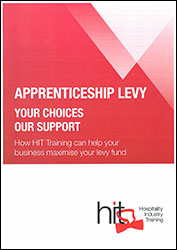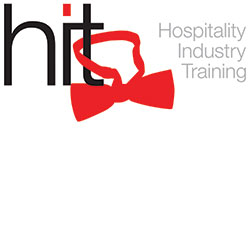Are you ready for the apprenticeship levy?
Some of the details still have to be thrashed out, but when the apprenticeship levy comes into force in April 2017, your business needs to be ready. Rosalind Mullen reports on how you can take action now
To guide employers through introduction of the new Apprenticeship Levy, HIT Training has devised a new handbook.
In addition to the handbook, HIT will also be running a series of webinars and blogs, all of which are focused on helping businesses through the process as the industry counts down to the levy coming into effect in April 2017.
"Our advice to hospitality businesses is to arm yourself with as much information as possible and work out the specific financial investment for your company, as well as the benefits this will bring about. At HIT Training we have created The Apprenticeship Levy Handbook which is a go-to guide for everything you will need to know about the new legislation - including information on the recent update from the government in August. It has been put together especially for the hospitality industry to help businesses maximise their levy funding and achieve the optimum return from apprenticeship programmes, for both the employer and staff members.
"If both businesses and training providers work together, we can use the new system to address the skills shortage in the industry and, coupled with the new standards, help to raise talent levels. This can only be a good thing."
The online resource can be downloaded free fromwww.hittraining.co.uk/apprenticeship-levy
With the shifting political landscape following the Brexit vote, many operators have understandably been distracted from focusing on the apprenticeship levy. Responsibility for apprenticeships has now moved from the Department for Business, Innovation and Skills to the Department for Education and there is a new skills minister, Robert Halfon. But despite the upheavals, the consensus is that the levy will go ahead.
So what is the apprenticeship levy? In a nutshell, from April 2017, every business with a payroll bill above £3m - including payments such as bonuses - will pay 0.5% of it towards apprenticeship training. The good news is that employers will also receive an allowance of £15,000 to offset against their levy payment. And there is also a 10% top-up for all levy- payers, so an employer paying a levy of £100,000 will have £110,000 to spend.
However, the proposals outline that companies with a pay bill lower than that will still have to pay 10% of the training costs.
The government is proposing to offer extra support - worth £2,000 (halved by the employer and training provider) per apprentice or trainee - for employers and training providers that take on 16- to 18-year-old apprentices or young care leavers. Employers with fewer than 50 employees will also have 100% of training costs paid for by the government if they take on these apprentices.
You may wonder why this training cost has been shifted over to employers. Well, the government wants to drive up skills, generating £3b of funding (up from £1.8b) to create three million apprentices across all industries by 2020. This sector alone will require 993,000 staff by 2022 - some 870,000 of whom will replace existing staff. By giving employers control of the funds, there is an incentive to work with training providers to ensure they deliver best value, fit-for-purpose programmes.
Sector skills council
Workforce development expert People 1st will manage the quality assurance of the new standards, so The Caterer invited People 1st's director of strategic policy, Annette Allmark, to talk us through the key points.
How will businesses pay the levy?
The levy will be at a rate of 0.5% of the total wage bill payable monthly through Pay as You Earn alongside income tax and National Insurance.
What is the arrangement for businesses that do not qualify to pay the levy?
The Brexit referendum delayed clarifications on funding expected in June, but it has now been confirmed that the employer contribution will be 10% of the cost of training - so if the cost is £3,000, the government will put in £2,700 and the employer will contribute £300.
Will the levy be dropped or delayed following Brexit?
The clear message from government is that there will be no major changes to the apprenticeship reform programme and the levy will go ahead in April 2017, so you need to start preparing for it now.
So, what can businesses that have to pay the levy be doing now?
Don't get complacent. Find out how the levy will affect your business - we can help make sure you get the best results from your levy payment, so get in touch with People 1st (see panel) and start talking to training providers so you can make a decision on which ones are right for your business needs.
What issues should they be aware of?
The levy will be paid monthly, based on payroll during that month, so some businesses may come in and out of the levy scope, for instance, at low or peak times. Employers will need to carefully calculate the number of apprentices they can pay for, so planning ahead is crucial. The starting point is to look at your workforce requirement and identify where an apprentice is the appropriate solution.
Annette Allmark
What is the Digital Apprenticeship Service?
This is the government's new online portal and one-stop-shop to support the English apprenticeship system (the devolved nations will each have their own apprenticeships and funding system). Levy payers will have access from January 2017 and those out of the levy scope will come on board in due course. It offers free tools and information to start your apprenticeship programme.
The levy will be paid into it like a bank account. Apprenticeship vacancies will also be advertised, as well as a list of training providers and independent end assessors. There is a prototype site online at the moment and the government is welcoming employer feedback on the design of the system.
In terms of finding training providers, what should all businesses be doing now - whether they pay the levy or not?
Identify two or three training providers and colleges and be clear with them about what you want to achieve. For instance, ask them how they would manage the training and overall process. Then make a considered choice based on the quality of service they can offer in line with your business needs. All employers will now make a financial contribution to the training, so it is important that you get the best out of your training provider. You should also seek support (see below).
Which training providers can you use?
From May 2017, only those on a new Register of Apprenticeship Training Providers, which will be established by the end of the year, can deliver apprenticeship training. Similarly, only independent assessors on the Register of Apprenticeship Assessment Organisations can conduct the end assessment of a hospitality apprenticeship.
Has the new 'trailblazer' apprenticeship system started?
It started in the spring. Commis chef and hospitality team member apprenticeships (both level 2) are live. Chef de partie (level 3), production chef (level 3), senior culinary chef (level 4), hospitality supervisor (level 3) and hospitality manager (level 4) will be launched by the end of the year.
How will hospitality industry recruiters benefit from the reformed system?
The new high-quality standards have been developed by employers to address the skills gap. Employers have also committed to a role in maintaining their ongoing quality. The Hospitality Apprenticeship Board, recognised by the government, is being established to ensure that our apprenticeships stay fit for purpose and People 1st is managing the nominations to the board (see www.people1st.co.uk/Hospitality-Apprenticeship-Board).
All this will raise the industry's profile as an employer. We need to recruit 993,000 workers by 2022. At the moment the staff retention bill is £247m and evidence shows that apprenticeships reduce this - 80% of companies who invest in apprentices report an increase in staff retention. Evidence shows that each apprentice can improve the bottom line by £5,200.
Why is there no mandatory qualification at the end of the new apprenticeships?
This is the exciting bit. The apprenticeship is the recognised outcome - the gold standard. Before, there was a pick and mix approach, where apprentices were trained in modules that were relevant to the business they were working in, but did not necessarily include the range of transferable skills needed by the industry as a whole, which led to skills gaps.
With the new standards, apprentices have to prove they can undertake the full range of skills that businesses say they need for their role. The standards also give businesses the flexibility and control to choose how best to train their apprentices - something that has previously been prescribed. So, apprentices will be better-rounded and well prepared to excel and take on future management and leadership positions.
Can the new apprenticeships really boost the image of the industry as an employer?
Yes. This is the industry's big opportunity to work together to raise professionalism and promote career pathways. These new, robust, standards have been developed by employers, and their quality will be maintained through the Hospitality Apprenticeship Board. They will, therefore, make hospitality a much more attractive career option for school and college leavers, and will help change the misconceptions many young people and their parents, carers and teachers have about the industry.
It is important that we work with Springboard and other careers organisations to take this message out to schools. We have made the apprenticeships a really good product and we need to champion it and change perceptions.
Any problems?
Don't panic. Come and talk to us. We can make it work.
Contact us atwww.people1st.co.uk
What the employers say
For some operators, the levy may seem daunting or complicated, but it needn't be.
"The message is, don't panic, embrace it," says Sally Beck, general manager at Lancaster London. "This is a chance to take control of the apprenticeship process because the training providers are now answerable to you."
Beck, who helped develop the hospitality trailblazer standards, is a stalwart supporter of the new apprenticeships, which came out in the spring. "We believe that the new standards are a much simpler programme than the old frameworks and that they enable much more flexible learning that will benefit our industry going forward."
In her view, the levy system is incentivising, too. "Employers are putting money into a pot. They then either set up apprenticeships and claim it back on delivery, or they don't - in which case they are essentially just paying an extra tax."
Sandra Kelly, head of education at Whitbread, has evidence that structured apprenticeships work. Five years ago the hotel, restaurant and pub giant - which now hires more than 1,000 apprentices a year across its Costa Coffee and Premier Inn businesses - introduced an in-house programme, WISE (Whitbread Investing in Skills and Employment).
"At Whitbread we know first-hand the enormous benefits that come with real investment in an apprenticeship training scheme. Our apprentices who have gone through the WISE programme are more likely to gain a promotion after 12 months than non-apprentices. Nearly two-thirds stay with us for more than 12 months, and in total the WISE programme saved us over £1.3m in recruitment, retention and progression costs in 2015/16," explains Kelly.
Whitbread introduced WISE because it was looking to double its size. "There was a business need to increase our recruitment pipeline," Kelly explains. "We knew we had to address team turnover and help change the perception of the hospitality industry as a stop-gap employment option."
To achieve this, the company recruited from the communities in which it operates and then invested in giving these recruits the training and workplace qualifications they needed.
"And I hope the apprenticeship levy will encourage businesses to take that approach," says Kelly, adding that Whitbread's next target is to expand to 6,000 apprentices by 2020.
Not least, Kelly believes the levy will make it easier for companies to manage their finances. "That is one of the great things about the levy. We know how much we will be paying in on a monthly basis, and then we can work out how much scope that gives us to expand, so we are drawing out the same amount.
"We will pay in monthly into a pot and then we can draw back from it what we put in. Eventually there will even be an opportunity to draw out more than we pay in as we grow the scheme."
Personnel and legal director Su Cacioppo at pub company JD Wetherspoon agrees. She points out that although under the previous system apprenticeships were not a cost to the business, the advantages of the new system are that the levy provides visibility and control over funding. Cacioppo adds: "The standards have been developed with employers, creating apprenticeships that suit the needs of the business."
And she believes they will help to raise the industry's image as a career choice. "This is a fantastic opportunity to develop lifelong learning while raising skills levels. It puts employers in the driving seat, creating apprenticeships that suit the needs of the business. It is a great opportunity to champion a career in the hospitality sector as an alternative to the traditional educational route."
How can training providers help?
Adele Oxberry, managing director at Umbrella Training, the training provider for Lancaster London, urges employers to start working with their training providers now - if they aren't already.
Levy payers need to be discussing how their business can adopt the new standards to achieve a quick return on investment (ROI), while non-levy payers should be engaged, so from April 2017 they know how to access funding.
"It is too early to say who will benefit the most, but the system has advantages for both small and large businesses," she says.
Oxberry is also vice-chair of the SME consortium for the new apprenticeship standards and levy and her company offers the #LevyLove campaign, which is designed to answer the queries of any employer, even if they do not use Umbrella as their provider.
"We offer a free 45-minute no-obligation consultation service, Twitter, email updates and lots of #LevyLove conversations," explains Sam Coulstock, Umbrella's business relations director.
"Our advice would be to work out your total levy bill for the year using the guidance on the Department for Education website."
Employers will need to work with their training providers to agree a rate for the new apprenticeship standards within the funding cap. This will enable you to assess how many apprentices you can pay for with your levy.
Coulstock reckons a particular benefit of the new system is that employers will now have to engage with their training provider. "Gone are the days of allowing an assessor into the business who applies a process not entirely understood by employers," he says.
"In the future, when you're recruiting a commis chef, for example, you will know that individual has had to meet a standard and passed an end assessment.
"We are finding that once employers see how it can work, they embrace it wholeheartedly and really see the benefits of them being in control."
At Remit Training, which is publishing a white paper outlining how employers should get prepared, levy expert Kathryn Gundle concurs: "By enabling employers to have a much larger say in the design of apprenticeships, they can ensure that the resulting qualifications focus on the role-specific skills, knowledge and behaviours that they require of the workforce of the future."
Get support
People 1st's apprenticeship network can help employers keep on top of the changes being introduced and how they might affect your business. It also offers a bespoke service to help you make the most of your levy payments and a network of accredited training providers.
Further information
www.gov.uk/government/publications/apprenticeship-levy-how-it-will-work
















